John Janaro's Blog, page 280
March 28, 2014
Newsflash: Pope Goes to Confession Like Other Sinners
 Pope hears confessions at St Peter'sToday there was a Penance Service at St. Peter's Basilica in Rome. Pope Francis preached about the Sacrament of Penance and Reconciliation. "We are all sinners, but God never tires of forgiving us," the Pope said, as he has said on numerous occasions.
Pope hears confessions at St Peter'sToday there was a Penance Service at St. Peter's Basilica in Rome. Pope Francis preached about the Sacrament of Penance and Reconciliation. "We are all sinners, but God never tires of forgiving us," the Pope said, as he has said on numerous occasions.Many priests had taken places in the basilica to hear the individual confessions of the faithful after the service. As is usually in the plan at these events, the Pope himself took a place with other priests to hear confessions from a limited group of people who (I assume) are chosen in advance for this seemingly special opportunity.
But first, the Pope surprised everybody by doing something that was not in the program. Before taking his own place in the confessional reserved for him, Pope Francis took the initiative himself to walk over to another confessional where a priest was waiting to receive penitents. The priest was no one particularly noteworthy, nor did it appear that anyone knew in advance what was about to take place. But the Pope knelt down in front of the priest in the middle of St. Peter's and in front of the world's broadcast cameras and received the sacrament himself, making his own confession and receiving the grace of absolution.
The Pope has his own confessor, to whom he (no doubt) turns frequently to receive this sacrament in private. This is a common practice; soon-to-be-Saint John Paul II went to confession every week. Still, for a pope to kneel publicly in a church and concretely acknowledge his own sinfulness and his need for the mercy of God in this sacrament is a most unusual gesture.
Of course, it's entirely appropriate and exemplary. Perhaps it has happened before, but before the age of ubiquitous video, no one took much notice. Yet here it is, once again much to the surprise of the world.
A lot of people don't realize that popes go to confession to another priest, just like everybody else. Well, now they can see it for themselves.
Maybe some people will see this and decide that if the Pope can do it, they can do it too.
If video does not appear above, click HERE to view on YouTube.
Published on March 28, 2014 20:10
March 27, 2014
Russian Troops, Western Sanctions, God's Peace
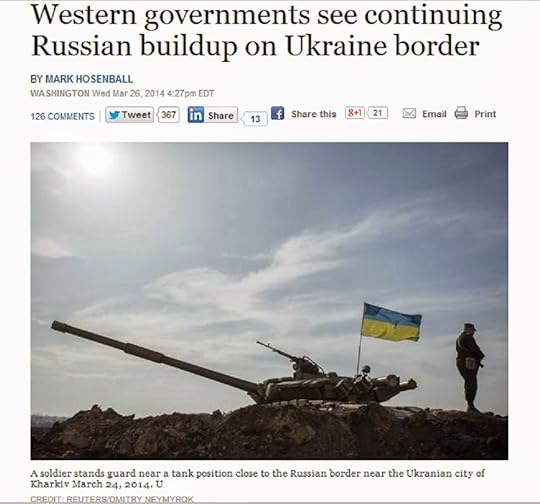 A buildup of Russian troops along the border of Eastern Ukraine continues, while the EU and the United States impose sanctions on Russian banks and key economic players as a response to Russia's incorporation of Crimea. It sounds like the situation is tightening up. Perhaps we will have war in the global village (or rather, more war, since there is already strife in Syria and many other places in the world).
A buildup of Russian troops along the border of Eastern Ukraine continues, while the EU and the United States impose sanctions on Russian banks and key economic players as a response to Russia's incorporation of Crimea. It sounds like the situation is tightening up. Perhaps we will have war in the global village (or rather, more war, since there is already strife in Syria and many other places in the world).But what would a major international conflict look like in the twenty first century? Someone would have to be the first to let hands go in the elaborate, interactive dance of the global economy. Perhaps this will be a war of economic attrition rather than bombs and battles (at least until someone gets desperate). We will probably develop strange new ways of wrestling with one another, while the great and terrible weapons of mass destruction lie idle or come into the hands of new powers who can then hold all of us hostage. Politics, ingenuity, or perhaps diplomacy may still yield all sorts of surprises. It's a new game. I don't know the rules. I'm far from sure that I even know who all the players are. Still, the essential human drama remains the same, as does the only human hope. Even in this present age, there will be peace only insofar as we depend upon the God of peace, the God of mercy.
"Will there ever be peace on this earth?" A Christian knows that, in a final and complete sense, the answer is "no". Peace comes at the end of all things. It is the New Jerusalem. Evil will endure as long as the present age endures.
A historian knows this too. Jesus concisely summed up the history of the world when He said, "there will be wars and rumors of wars...." The history of the world is largely a history of war.
But can we not desire peace, work for peace, pray for peace -- at least as much peace in as many places as frail human nature will bear? Certainly. "World Peace" is a phrase that leads easily to utopia, to dreams and abstractions. But peace among real people, in real circumstances, in a given period of time (precious time), is within the reach of human efforts aided by the God of peace. Blessed are the peacemakers, for they shall be called sons of God.
I have no solutions to offer for resolving any of the current conflicts that plague our world. There are the conflicts that are always in front of us, but there are other wars too, smaller ones that we don't hear about unless we really search through the news. And there are peoples who look upon each other across borders, and even within borders, as hated enemies.
What can I do to be a peacemaker in the world?
There is another beatitude that contains the key: Blessed are the merciful, for they shall obtain mercy.
Mercy is the key to peace.
Peace with God, which is where it all begins. Peace within the family, in the parish, in the community, in work relationships, on the Internet...Peace in my world. Peace can radiate out from me, if I am a man of mercy, if I do the works of mercy.
What does this mean? It means a whole new way of looking at human weakness, human frailty, human failure, in myself and in those I encounter. The weakness of others, the faults of others, the capacity that others have to cause us pain by their failures and above all in their actions toward us--all of these things give birth to conflict, estrangement, and separations. They wound and break relationships. They divide us. They take root and establish the foundations of rivalry and the partisan spirit that so often afflicts our common endeavors.
Mercy changes everything. Mercy sees the weakness in others as a possibility to help, to give, to forgive, perhaps to endure through love. Mercy gives "space" to the other person for growth in love; mercy gives encouragement, extends empathy, seeks to build up--always--unity in truth and love. Sometimes, mercy must have the courage to fight, to break down resistance, to seek out those who have run away--but mercy never fights against the person; it always fights for the person, for their true good and against what hinders it.
Mercy seeks, especially in the face of human weakness and failure, for the constructive possibilities of love, of rebuilding what is human, of healing. Mercy is love's response to weakness, indifference, and even rejection. It does not take offense. It keeps on loving. It loves more.
But I cannot be merciful by my own power. I have received, and continue to receive, mercy from God. He is healing me, and it is only through Him that I can hope to be an instrument of mercy to others. It is only through Him that I will find the courage to suffer that weakness and failure in others and in myself that remains, for as long as it remains.
This is what builds peace: persons, families, communities, environments where mercy is given and received. This is the hope of peoples and nations: forgiving and moving forward, bearing one another's burdens, working together toward a common goal. Solidarity. Mercy. Even on the political level, the Christian proposal is the only reasonable and practical hope for human community: not another ideology of violence but a "politics of mercy."
All mercy flows from the Cross, where Jesus responds to all our violence and all our resistance by enduring it in His own body and giving it back to us as a gift of love.
Let us begin by opening our hearts to receive this Gift. Jesus I trust in You.
Published on March 27, 2014 15:58
March 25, 2014
Mary's Unique Name: The Grace-Filled One

Today is the wonderful feast of the Annunciation. In the midst of Lent, we pause to remember that the foundation of the value of any penance we do is the gratuitous gift of God who comes to dwell among us. By the power of the Holy Spirit, the only-begotten Son of the Father has become incarnate in the womb of the Virgin Mary.
This is the astonishing, inexhaustibly new "news" that the angel Gabriel announces to a young girl in Nazareth, and to the whole world through her and the witness of St. Luke's gospel.
Inseparable from this revelation, however, is something else that the angel makes known. God has prepared a "place" for himself and his coming. The power of the Incarnation and Redemption "already" brings about in a perfect way the new reality, the new life that God wills to share with the world in giving his only Son.
For the announcement we celebrate today begins with the "angelic salutation" that we know so well. When we pray, "Hail Mary, full of grace" (cf. Luke 1:28) we echo those words. The original Greek text is "Chaire, kecharitomene," and many English language Bibles translate this as "Rejoice, O favored one." Indeed, the Greek "chaire" is well rendered as "rejoice," which is evocative of the messianic joy of "Daughter Zion" in the prophets (see Zephaniah 3:14). Perhaps from the Ave of the Latin Vulgate to the "Hail" of our classic Marian prayer something of the jubilant connotation is not so directly conveyed to us. It is present nonetheless, and it is worth remembering this moment of Mary's joy when we pray the "Hail Mary."
The term that follows, however, is quite precise and unique, even if those translations that use the term "favor" would appear to weaken its force or render its significance vague. The entire content of the Annunciation makes it clear that this is no ordinary "favor" of God. Mary is destined to carry the Holy One, to be "overshadowed" by the presence of God's glory, the Shekinah of the cloud and the fire that descended upon the mercy seat in the Holy of Holies, the sanctuary of Israel reserved to the high priest in the ritual of atonement, the place where Moses spoke with God.
Moreover, "kecharitomene" is not a mere adjective but a substantive term, like a name. Mary is not just "favored" in a relative sense; she is "the favored one." And what kind of a "name" is this, and what more does it convey? Gabriel calls Mary kecharitomene. No one else in the Bible is identified with this term. No one. Translations can try to "tone that down" all they want; they can't take away the fact that the "chari" in "kecharitomene" is the "charis" of St. Paul, by which we are redeemed and justified and set free from sin and sanctified. Grace.
The new life. Mary not only "has" it; it totally penetrates her identity. She is the one who is graced. St. Jerome, who's Greek was pretty good, rendered this in Latin as gratia plena. Mary is "full of grace"--if anything the original Greek is stronger and more emphatic than this. It indicates a reality unique to Mary, that entirely encompasses who she is.
Mary is The Graced One; she is nothing else but this gift of grace, perfected by God from the beginning in view of the One who would take flesh in her womb, and with whom she would cooperate by her loving, grace-filled yes all the way to the Cross and to our redemption.
The angelic salutation and Mary's free response are mutual components of the mystery of the new covenant revealed on this day, the truth of human destiny, the full unveiling of the plan of God that already illuminates the joyful heart of Mary full of grace.
Published on March 25, 2014 18:11
March 24, 2014
Oscar Romero: The Meaning of Death and Life
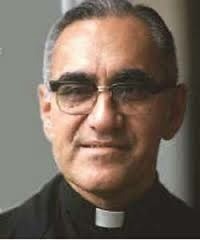 On March 24, 1980, the Servant of God Archbishop Oscar Romero of San Salvador was assassinated while celebrating Mass in the Divine Providence hospital chapel, where he also resided. In the present time, El Salvador honors his memory with a week of celebrations, and people continue to pray for his beatification.
On March 24, 1980, the Servant of God Archbishop Oscar Romero of San Salvador was assassinated while celebrating Mass in the Divine Providence hospital chapel, where he also resided. In the present time, El Salvador honors his memory with a week of celebrations, and people continue to pray for his beatification.Once again, I wish to remember this great hero of the faith on the American continent, this bishop whose blood was not spilled in vain, who showed the cost of courage, of putting the gospel of Jesus above all ideologies, of the Church's right and duty to openly denounce evils and call everyone to conversion and to be transformed by the merciful love of God in Jesus Christ.
"The voice of the Church continues to be known and wants to be the voice that preaches the eternal message of the Lord. Despite the distortions and ill-will and slanders and defamation the voice of the Church wants to be that voice that from the heights of heaven draws all things unto herself so that we can speak about the meaning of death and life, the meaning of government and the struggle for just demands, the meaning of well-being and misery and living on the margins of society and the meaning of sin. The Church wants to speak about all these realities so that, illuminated with the vision of eternity, we make this earth what it was meant to be, a foretaste of heaven and not a war zone or a place where passions run wild. Indeed, as sisters and brothers, as children of God, we are all on a journey toward heaven, toward [Christ] the head of the body."
(from a sermon of Archbishop Oscar Romero, 1979)
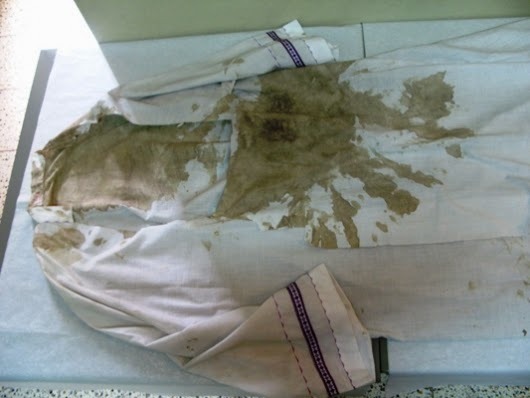 Blood stained vestments worn by Archbishop Romero on March 24, 1980
Blood stained vestments worn by Archbishop Romero on March 24, 1980
Published on March 24, 2014 19:49
March 23, 2014
A Church of Saints, Sinners, and Hypocrites
 "See, it's all there. Everything's fine."The great French poet Charles Peguy wrote that the Christian people are always made up of "saints and sinners." It would be useful to introduce a third category: hypocrites.
"See, it's all there. Everything's fine."The great French poet Charles Peguy wrote that the Christian people are always made up of "saints and sinners." It would be useful to introduce a third category: hypocrites.The difference between the latter two is that the sinners appear just as they are, whereas the hypocrites -- while not usually trying to pass themselves off as saints (this would hardly look humble) -- spend a great deal of energy trying to convince others and themselves that they are not in the "sinner" category.
The hypocrite scrubs the outside of the cup forcefully and energetically. The world is not going to think it sees a saint, but the hope is that it will see a "good person," an admirable person, perhaps even a person who is "making progress in spiritual growth" and who therefore deserves some credit. Indeed, most hypocrites like to see themselves this way.
Lately I've been thinking a lot about (obsessing over?) hypocrisy, by which I mean above all my own lifelong pervasive hypocrisy in particular. I've been blessed to a great extent, however, by the fact that so often people are not fooled by me (even though I'm a master at fooling myself). They see the wildly incoherent mess that I am as a human being, but also the good that is mixed into it (often in qualities and actions that are not the focus of my attention, that I don't particularly nurture in my efforts to construct my outward appearance). They see it better than I do, because I'm desperately intent on fooling myself and I always at least partially believe the self-image that I try (or feel compelled) to construct.
Thank God, there are some people who love me anyway; they love the whole "package," and put up with my blindness as they try, gently, to lead me in the right direction. For me, there's no question that my wife ranks number one on the list of these people.
It's a patient and slow and long-suffering process for these people, to chip away at this hypocrisy that pains them because they can see how much it obscures the real beauty of the one they love. It's a great work of mercy.
Of course, I know I'm not the world's only hypocrite. Of the "saints, sinners, and hypocrites," the third category is probably the largest by far. Hypocrisy can be a complex thing. There are of course those who just plain fake exterior goodness because it gives them a disguise; it allows them greater freedom to rip people off and do all kinds of bad things without incurring suspicion.
But then there are very many of us who really want to be true heroes and saints. We see that it's good, it's beautiful, it's "what the world needs from us," but a subtle discouragement has worked its way into some deep places in our souls. We realize that we can't make ourselves be really, truly holy. And yet, that's the way we're "supposed" to be, and the way we really want to be.
So we try to do it on the cheap. We try to construct ourselves into the people we think we should look like. So many of us are building houses of wood with stone facades. There is real goodness in us, real aspirations, real gifts, but we try to use them to decorate the outside. And we are afraid to look any deeper than this exterior, this facade, because we want to believe in our strength; we don't want to see the naked, cold, hungry, lonely person inside that house. We are afraid of that person -- that unsolved riddle that is at the deepest core of ourselves -- because we don't know what to do that person, and we can't imagine that anyone else would want to love that person.
I know I'm being hypocritical in this way all the time, but I presume to use "we" in this context because I'm sure my experience is not uncommon. Who among us is not, in some way, in some respect, cheating (just a little bit?) in the project of building themselves? We're fibbing or we're faking or at the very least we're hiding the messy stuff. We're hypocrites.
Woe unto us?
What can we do? After all, the New Evangelization is all about witnessing with our lives, and so if our lives are a mess, shouldn't we at least have a strategy to try to make them look good, y'know so as to "attract people..."?
There is a place to start. There is that cold, hungry, sorrowful person inside us, that poor person. Let's not suffocate that person entirely. Let that person cry out to God. Let that place inside us where there are no illusions be a place that begs for mercy. There is that place where we recognize that we are a total need for Him, and from that place let us cry out and give the whole mess and the hypocrisy and everything else to Him.
He will build us up.
Published on March 23, 2014 20:39
March 21, 2014
The Janaros: What We Looked Like Ten Years Ago
I came across this picture in my archives and it was just too good to pass up. It was taken sometime in the early part of the year 2004. In other words, it's a picture of the Janaro family ten years ago.
 Left to right: Lucia (3), Agnese (5), and John Paul (6) on the bottom row.
Left to right: Lucia (3), Agnese (5), and John Paul (6) on the bottom row.
On top is Eileen holding Teresa (1) and me with the goatee I had back then.
There we are... or rather, there are 6/7ths of the family. Josefina did not yet exist. We could not even imagine Josefina, nor could we have guessed at all the things we would experience and endure in the coming decade. What a time it has been!
What will the next ten years bring? It's not much use trying to predict, much less control, the events that will shape our journey. Of course we must make assessments and judgments about the future and map out a course according to the circumstances that we will probably be facing in one form or another (such as, for example, seeing these four little ones through college and onto their vocational paths). There may be grandchildren in ten years. There will also arise many comic, tragic, joyful, sorrowful, and generally unanticipated aspects of our family life. The world we live in may be a very different place: better or worse, or probably both in diverse ways. And it's always possible that some of us or all of us may be gone from this earth ten years from now.
One thing we know for sure, and that is that whatever happens will be an invitation to embrace more fully the mystery of life, to say yes to the gift of everything and to the One who gives.
 Left to right: Lucia (3), Agnese (5), and John Paul (6) on the bottom row.
Left to right: Lucia (3), Agnese (5), and John Paul (6) on the bottom row.On top is Eileen holding Teresa (1) and me with the goatee I had back then.
There we are... or rather, there are 6/7ths of the family. Josefina did not yet exist. We could not even imagine Josefina, nor could we have guessed at all the things we would experience and endure in the coming decade. What a time it has been!
What will the next ten years bring? It's not much use trying to predict, much less control, the events that will shape our journey. Of course we must make assessments and judgments about the future and map out a course according to the circumstances that we will probably be facing in one form or another (such as, for example, seeing these four little ones through college and onto their vocational paths). There may be grandchildren in ten years. There will also arise many comic, tragic, joyful, sorrowful, and generally unanticipated aspects of our family life. The world we live in may be a very different place: better or worse, or probably both in diverse ways. And it's always possible that some of us or all of us may be gone from this earth ten years from now.
One thing we know for sure, and that is that whatever happens will be an invitation to embrace more fully the mystery of life, to say yes to the gift of everything and to the One who gives.
Published on March 21, 2014 20:50
March 20, 2014
St. Joseph's Day: Reflections on Being a Father
 Detail of St. Joseph on our mantle at home.
Detail of St. Joseph on our mantle at home.Yesterday was the beautiful Solemnity of St. Joseph, who has helped me in ways beyond counting all through my life. Every day I pray to St. Joseph and entrust especially our family to him. He has never failed me, and he continues to teach me and sustain me. He takes such strong and gentle care of us, always bringing us where we need to be.
Every day, I thank him.
Yesterday was a day for pondering and praying about fatherhood. I found myself feeling a little sentimental. There was a Nationals' spring training game on TV (regular season starts March 31 -- GO NATS!). We're beginning our tenth season with the Nationals. I remember the year 2005, when John Paul was eight years old and we used to listen to the games on the radio. He hadn't yet become a baseball wizard, and sometimes I would doze off during the broadcast and then be awakened by this little boy shaking me and shouting, "Daddy, what happened?" The sound of loud cheering was coming through the radio. So I had to pay attention and figure out what happened.
And then I remembered myself, about four or five years old, listening to Beethoven's seventh symphony or Dvorak's cello concerto with my father. We were both "conducting" in their air with our hands. Thanks, Dad.
And I prayed to St. Joseph, and asked him to pray for me to the Lord, and obtain for me the grace to become the human person that I have been created and called to be. To be the man, the husband, the father that God wills me to be. To be the friend, mentor, and spiritual father that he asks me to be to those he entrusts to me (indeed, as I get older I see more and more how "spiritual fatherhood" encompasses so many of my relationships with people). To be the spiritual brother that God wills me to be, in some manner, to every person I meet, but especially to those I encounter on my daily path of life. To be a servant, to be helpful, to give encouragement and empathy and attention to persons. To be an instrument of God's mercy.
I pray to be the teacher, the writer, the seeker of truth and understanding that he has called me to be, with humility and also with courage and confidence. Whatever my circumstances, I do have work, and God is leading me into the places where he wants me to do this work.
I pray for these graces, and I ask St. Joseph to pray for me, because I need them. My vocation is infinitely beyond anything that I can accomplish by my own power. This is true of everyone. As fathers and mothers, brothers and sisters, we are entrusted with new life in the Risen Jesus, to give and receive and share in his Spirit, as members of his body, the Church, with hearts that seek out every person and all the world.
We are entrusted with Jesus; we are called to give over our energies and aspirations so as to build "places" where Incarnate Love dwells in the world.
No one understands better what this means than St. Joseph. And he can help us so much. He is always ready to help.
St. Joseph, thank you.
Lord God, my Father, thank you for everything.
Published on March 20, 2014 15:14
March 17, 2014
Winter Storm "Patrick" Makes the Day White
 We continue to chronicle the wacky winter weather of the year 2014 with a special "St. Patrick's Day Edition." Do you see that shamrock over there with all of its lovely Irish green?
We continue to chronicle the wacky winter weather of the year 2014 with a special "St. Patrick's Day Edition." Do you see that shamrock over there with all of its lovely Irish green?We didn't see any shamrocks yesterday. We didn't see any green yesterday, at least not outside the house. Yesterday we were treated to a foot of St. Patrick's Day White. If only it were the froth on top of a nice pint of stout. But it wasn't. It was more of the snowy stuff.
We're tired of the snowy stuff. Do you want to know how tired we are of it? I'll tell you: the schools were closed but the children were not happy about it!
The children are tired of snow days. They've build their forts; they've built their tunnels; they've built their snowmen; they've had their snowball fights and done their sledding. Teresa even went cross country skiing! Just look: snow was still fun back in February:
 Teresa's snow fort from FEBRUARY: a perfectly respectable time for snow.
Teresa's snow fort from FEBRUARY: a perfectly respectable time for snow.
 Mess around with plastic sleds in FEBRUARY? Sure! (Teresa and Agnese)
Mess around with plastic sleds in FEBRUARY? Sure! (Teresa and Agnese)
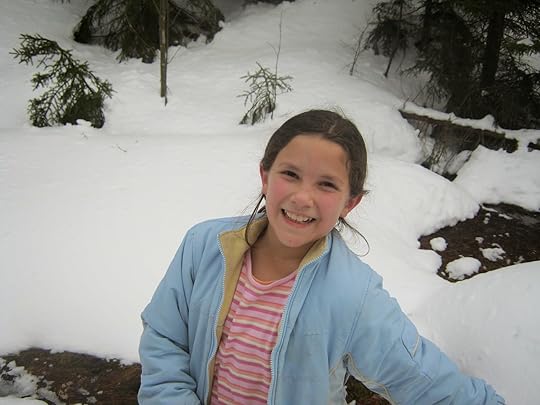 Teresa skiing with friends: look at that happy face... three weeks ago!
Teresa skiing with friends: look at that happy face... three weeks ago!All that's fine and lovely. But this is Virginia. It's supposed to be... ummm... what we call in America "the South"... and that means by mid March I expect to see something like this:
 This is what I should be seeing around St. Patrick's Day: Our wild forsythias in bloom!
This is what I should be seeing around St. Patrick's Day: Our wild forsythias in bloom!Instead, after almost a week of being tricked by nice warm temperatures, St. Patrick's Day brings us this:
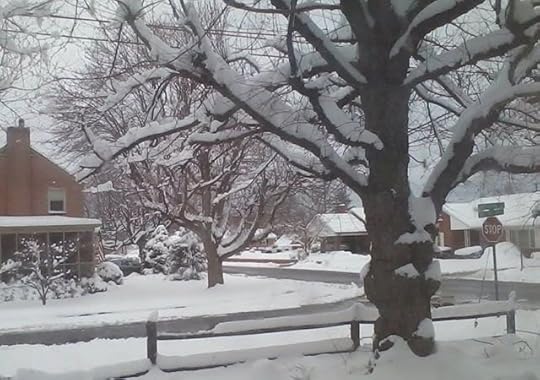 No, no, no, this can't be right. Spring starts, like LEGALLY, this week!
No, no, no, this can't be right. Spring starts, like LEGALLY, this week!Enough is enough. This is why we don't live in Minnesota! Still, weather is weather. I don't know if this has any relation to "climate change" (wasn't that supposed to make it warmer?--I know, it's more complicated than that; just attempting a joke). In the short run, what can we say? There's no one to blame. No place to file a complaint. And nice weather is not for sale.
Weather is not the only thing in these days that is reminding us that our real life is given to us, and that we do not make ourselves according to our own whims. If nothing else, there are air currents and moisture that affect us. When Spring finally comes, there will be things like flies. Flies! (Pascal remarks about how the annoyance of a fly buzzing in the ear is sufficient to prove that the human mind is not in control of reality [see Pensees 366].) Weather and flies, and other persons and the world with its nations and peoples and history and wars....
Perhaps we can still help change the hearts of people. We can pray and fast and bring the real strength of the spirit into play. But today's weather (at least) must be taken for what it is. And "what it is," on this St. Patrick's Day, is snow.
Oh, but it wasn't so bad. Eileen made a stew with chicken and cabbage and carrots and we had mashed potatoes, and there must have been some seasoning in it unknown to the Celtic peoples because it was very tasty!
And we did see a shamrock, in fact. Years ago we bought a small toddler sized tee shirt for a two year old John Paul. We were visiting friends in Boston's North End (i.e. the other ethnic neighborhood in that venerable town) and we found a little shirt with the saying "A wee bit Irish [not spelled out but represented by a shamrock] e tutti Italiano!" John Paul and the other kids all wore it when they were two or three years old.
Josefina is seven and a half. It still fits her:
 She's one of "the wee folk"... but worth more than any pot of gold!
She's one of "the wee folk"... but worth more than any pot of gold!
Published on March 17, 2014 20:23
March 15, 2014
Hard Lives
 Blankets... you don't wanna see me todayI'm in bed with my Tablet, and I have no idea what I'm going to write. Probably not much.
Blankets... you don't wanna see me todayI'm in bed with my Tablet, and I have no idea what I'm going to write. Probably not much.I feel like my brain hurts.
That makes no sense, of course. It's just a headache, and exhaustion and feeling run down mentally. I've been battling obsessions in the mornings again, from the moment I wake up. I use half a day's worth of my energy to get out of bed.
Today I didn't get out of bed.
I feel like my brain hurts. It's true that I have wacky neurotransmitters. And of course, I also have a chronic bacteriological infection that can cross the blood/brain barrier. So, is the Lyme flaring up? Who knows. I used to blame everything on Lyme disease, perhaps with good reason, but I want very much to believe that we've got that whole business in remission.
The headaches are strange. It's not an intense pain, but more like a draining thing and something that feels... like inflammation. I've had these every so often for years, since the Lyme came along. Eventually they go away.
What about OCD and depression? It's been a difficult winter. There are days (like today) when I feel like I'm walking very close to the edge, but I've been able to pull back. This scares me, frankly. I'm worn out from struggling against this, but I have no choice. Even on the edge, I've got to keep my balance.
I have plenty of respite, though. A lot of the time it's not so bad, and I'm okay if I pace myself and don't push myself too hard (or get too lazy). Sometimes, however, life pushes, and all you can do is spend whatever strength you have, and ask for help when it's needed.
We are a close family. But we're a family with a sick father. Of course, the kids are learning to appreciate their father in different ways and to be compassionate and all that. I know. But it's hard for them, and for their mother. It's not normal. I always write about the funny things, but we have a lot of challenges. And we're not saints. Life is hard.
Many people I know have had hard winters, with kids getting sick over and over again, with crazy weather, with men losing their jobs and women suffering miscarriages, with tragedies to endure. Many people I know have hard lives (everyone does, really, but sometimes things are going better than other times, and sometimes people carry secret burdens).
So we are all together in this, with Jesus.
But my mind is wandering, and I keep typing the wrong letters. I'm going to put this away now. I embrace you all. Let us pray for one another.
Published on March 15, 2014 12:46
March 13, 2014
One Year Ago Today: Habemus Papam!
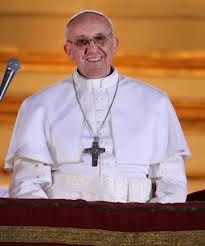 Time is a very mysterious thing. Has it really only been one year?
Time is a very mysterious thing. Has it really only been one year?One year ago today, a face appeared on the balcony of St. Peter's Basilica. His name was familiar to only a handful of people.
For the rest of us it was a new encounter and the beginning of a new journey.
God bless you with many more years, Pope Francis!
Published on March 13, 2014 18:07



